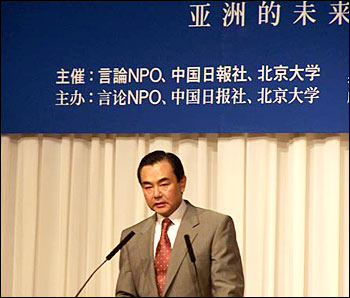| Tools: Save | Print | E-mail | Most Read |
| Trust and Understanding Key to China-Japan Ties |
| Adjust font size: |
China and Japan should strengthen understanding and rebuild mutual trust to surmount the ongoing problems plaguing their relations, said the Chinese ambassador to Japan yesterday. Ambassador Wang Yi's call for renewed efforts at improve relations came at the opening of the second Beijing-Tokyo Forum.
Around 90 officials and scholars from China and Japan are participating in the two-day event which is looking at ways of defrosting the current icy bilateral relations. Improving Sino-Japanese relations had become a common aspiration of the people of both countries, said Wang. The souring of relations between Beijing and Tokyo owes much to Japanese Prime Minister Junichiro Koizumi's annual visits to the Yasukuni shrine where convicted World War II war criminals are honored along with Japanese war dead. His visits to the shrine, which began shortly after he took office in 2001, have led to top leaders of neighboring countries halting visits for the past five years. China insists the shrine visits have undermined the political basis for bilateral relations and pose a significant obstacle to improving them. "Facing up to history honestly and settling the current problems in a proper way would provide an opportunity and impetus to build a stable long-term relationship that looks to the future," said Wang. He told the forum that if Tokyo decides to remove the political obstacles which have chilled the relationship Beijing was sure "to respond with good will." Japanese Chief Cabinet Secretary Shinzo Abe, the favorite to be Japan's next prime minister, said in a keynote speech that he personally wanted a strong Sino-Japanese relationship.
"The China-Japan relationship is one of the most important bilateral relations," said Abe. He attributed the current difficulty in bilateral ties to "misunderstandings" that had occurred between the two Asian giants. To illustrate the difficulties Abe cited some statistics. In 1980, according to him, 78 percent of Japanese people had a positive attitude towards China but this figure had dropped to just 32 percent some 25 years later. In China only 15 percent of the population now felt positively about Japan. "For me these are shocking figures," Abe said. "We must build a China-Japan relationship that will encourage these figures to increase naturally." He applauded the forum for providing an opportunity for discussion which was badly needed to make direct exchanges possible. Wang said it was necessary for both countries to take their own roads towards peaceful development. It was also imperative for the two sides to rebuild trust which, he said, was as important in state-to-state relations as in person-to-person contact. Wang expressed the belief that China and Japan would benefit from a better relationship. "It's a win-win deal," he observed. The future of Sino-Japanese relations was a matter of great significance, not just for the two nations, but for Asia and the world as a whole, Wang said. Better bilateral relationships were what Asian countries and the international community expected from China and Japan, he added. Abe said that as well as official efforts more channels should be developed to find the solutions to the problems facing bilateral relations. He said the Japanese government had decided to invite 1,200 Chinese high school students to Japan this year. They would stay with Japanese host families so as to have the best possible experience of the country. Forty of the students would remain in Japan studying at high schools for a year. Youth exchanges of this type were of great importance in promoting a long-term friendship between the two countries, Abe added. |
| Tools: Save | Print | E-mail | Most Read |
 |
| Related Stories |
| Product Directory China Search |
Country Search Hot Buys |

